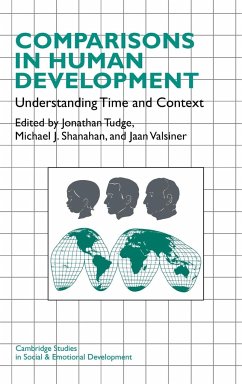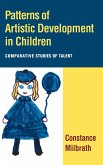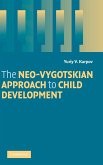Comparisons in Human Development
Herausgeber: Tudge, Jonathan; Valsiner, Jaan; Shanahan, Michael J.
Comparisons in Human Development
Herausgeber: Tudge, Jonathan; Valsiner, Jaan; Shanahan, Michael J.
- Gebundenes Buch
- Merkliste
- Auf die Merkliste
- Bewerten Bewerten
- Teilen
- Produkt teilen
- Produkterinnerung
- Produkterinnerung
This important volume deals with the issue of how to make comparisons in the field of human development.
Andere Kunden interessierten sich auch für
![Status and Social Comparisons Among Adolescents Status and Social Comparisons Among Adolescents]() Carol VidalStatus and Social Comparisons Among Adolescents198,99 €
Carol VidalStatus and Social Comparisons Among Adolescents198,99 €![Patterns of Artistic Development in Children Patterns of Artistic Development in Children]() Constance MilbrathPatterns of Artistic Development in Children125,99 €
Constance MilbrathPatterns of Artistic Development in Children125,99 €![Development and Disabilities Development and Disabilities]() Robert M. HodappDevelopment and Disabilities114,99 €
Robert M. HodappDevelopment and Disabilities114,99 €![The Neo-Vygotskian Approach to Child Development The Neo-Vygotskian Approach to Child Development]() Yuriy V. KarpovThe Neo-Vygotskian Approach to Child Development109,99 €
Yuriy V. KarpovThe Neo-Vygotskian Approach to Child Development109,99 €![Human Development in the Twenty-First Century Human Development in the Twenty-First Century]() Alan Fogel / Barbara J. King / Stuart G. Shanker (eds.)Human Development in the Twenty-First Century114,99 €
Alan Fogel / Barbara J. King / Stuart G. Shanker (eds.)Human Development in the Twenty-First Century114,99 €![Research Comparisons And Medical Applications Of Ericksonian Techniques Research Comparisons And Medical Applications Of Ericksonian Techniques]() Research Comparisons And Medical Applications Of Ericksonian Techniques68,99 €
Research Comparisons And Medical Applications Of Ericksonian Techniques68,99 €![The Mind of the Child: ... Observations Concerning the Mental Development of the Human Being in the First Years of Life; Volume 1 The Mind of the Child: ... Observations Concerning the Mental Development of the Human Being in the First Years of Life; Volume 1]() William T. PreyerThe Mind of the Child: ... Observations Concerning the Mental Development of the Human Being in the First Years of Life; Volume 140,99 €
William T. PreyerThe Mind of the Child: ... Observations Concerning the Mental Development of the Human Being in the First Years of Life; Volume 140,99 €-
-
-
This important volume deals with the issue of how to make comparisons in the field of human development.
Hinweis: Dieser Artikel kann nur an eine deutsche Lieferadresse ausgeliefert werden.
Hinweis: Dieser Artikel kann nur an eine deutsche Lieferadresse ausgeliefert werden.
Produktdetails
- Produktdetails
- Verlag: Cambridge University Press
- Seitenzahl: 382
- Erscheinungstermin: 31. Juli 2015
- Englisch
- Abmessung: 235mm x 157mm x 27mm
- Gewicht: 769g
- ISBN-13: 9780521482028
- ISBN-10: 052148202X
- Artikelnr.: 22710085
- Herstellerkennzeichnung
- Libri GmbH
- Europaallee 1
- 36244 Bad Hersfeld
- gpsr@libri.de
- Verlag: Cambridge University Press
- Seitenzahl: 382
- Erscheinungstermin: 31. Juli 2015
- Englisch
- Abmessung: 235mm x 157mm x 27mm
- Gewicht: 769g
- ISBN-13: 9780521482028
- ISBN-10: 052148202X
- Artikelnr.: 22710085
- Herstellerkennzeichnung
- Libri GmbH
- Europaallee 1
- 36244 Bad Hersfeld
- gpsr@libri.de
1. Introduction; Part I. Metatheoretical Approaches to Developmental
Comparison: 2. Developmental comparison Lucien Winegar; 3. Developmental
concepts across disciplines Michael J. Shanahan, Jaan Valsiner and Gilbert
Gottlieb; 4. Ecological perspectives in human development: a comparison of
Gibson and Bronfenbrenner Jonathan Tudge, Jacquelyn Gray and Diane Hogan;
Part II. Paradigmatic Statements: 5. Nested comparisons in the study of
historical change and individual adaptation Michael J. Shanahan and Glen H.
Elder, Jr; 6. The value of comparisons in developmental psychology Debra
Mekos and Patricia A. Clubb; 7. Implications from developmental
cross-cultural research for the study of acculturation in Western
civilizations Beth Costes, Rona McCall and Wolfgang Schneider; Part III.
Comparisons at the Level of Data: 8. The co-development of identity, agency
and lived worlds Dorothy C. Holland and Debra G. Skinner; 9. Sociocultural
promotions constraining children's social activity: comparisons and
variability in the development of 'friendships' Paul A. Winterhoff; 10. The
everyday experiences of North American preschoolers in two cultural
communities: a cross-disciplinary and cross-level analysis Jonathan Tudge
and Sarah Putnam; Part IV. Commentaries: 11. Developmental science: a case
of the bird flapping the wing, or the wing flapping the bird?: commentary
on Winegar's chapter Jeanette A. Lawrence; 12. Conceptual transposition,
parallelism and inter-disciplinary communication: commentary on Shanahan,
Valsiner, and Gottlieb's chapter Jeanette A. Lawrence and Agnes E. Dodds;
13. The 'ecological' approach: when labels suggest similarities beyond
basic concepts in psychology Angela Branco; 14. Problems of comparison:
methodology, the art of story-telling, and implicit models Hideo Kojima;
15. The promise of comparative, longitudinal research for studies of
productive-reproductive processes in children's lives William A. Corsaro;
16. Integrating psychology into social science: a commentary on Tudge and
Putnam, and Holland and Skinner James Youniss.
Comparison: 2. Developmental comparison Lucien Winegar; 3. Developmental
concepts across disciplines Michael J. Shanahan, Jaan Valsiner and Gilbert
Gottlieb; 4. Ecological perspectives in human development: a comparison of
Gibson and Bronfenbrenner Jonathan Tudge, Jacquelyn Gray and Diane Hogan;
Part II. Paradigmatic Statements: 5. Nested comparisons in the study of
historical change and individual adaptation Michael J. Shanahan and Glen H.
Elder, Jr; 6. The value of comparisons in developmental psychology Debra
Mekos and Patricia A. Clubb; 7. Implications from developmental
cross-cultural research for the study of acculturation in Western
civilizations Beth Costes, Rona McCall and Wolfgang Schneider; Part III.
Comparisons at the Level of Data: 8. The co-development of identity, agency
and lived worlds Dorothy C. Holland and Debra G. Skinner; 9. Sociocultural
promotions constraining children's social activity: comparisons and
variability in the development of 'friendships' Paul A. Winterhoff; 10. The
everyday experiences of North American preschoolers in two cultural
communities: a cross-disciplinary and cross-level analysis Jonathan Tudge
and Sarah Putnam; Part IV. Commentaries: 11. Developmental science: a case
of the bird flapping the wing, or the wing flapping the bird?: commentary
on Winegar's chapter Jeanette A. Lawrence; 12. Conceptual transposition,
parallelism and inter-disciplinary communication: commentary on Shanahan,
Valsiner, and Gottlieb's chapter Jeanette A. Lawrence and Agnes E. Dodds;
13. The 'ecological' approach: when labels suggest similarities beyond
basic concepts in psychology Angela Branco; 14. Problems of comparison:
methodology, the art of story-telling, and implicit models Hideo Kojima;
15. The promise of comparative, longitudinal research for studies of
productive-reproductive processes in children's lives William A. Corsaro;
16. Integrating psychology into social science: a commentary on Tudge and
Putnam, and Holland and Skinner James Youniss.
1. Introduction; Part I. Metatheoretical Approaches to Developmental
Comparison: 2. Developmental comparison Lucien Winegar; 3. Developmental
concepts across disciplines Michael J. Shanahan, Jaan Valsiner and Gilbert
Gottlieb; 4. Ecological perspectives in human development: a comparison of
Gibson and Bronfenbrenner Jonathan Tudge, Jacquelyn Gray and Diane Hogan;
Part II. Paradigmatic Statements: 5. Nested comparisons in the study of
historical change and individual adaptation Michael J. Shanahan and Glen H.
Elder, Jr; 6. The value of comparisons in developmental psychology Debra
Mekos and Patricia A. Clubb; 7. Implications from developmental
cross-cultural research for the study of acculturation in Western
civilizations Beth Costes, Rona McCall and Wolfgang Schneider; Part III.
Comparisons at the Level of Data: 8. The co-development of identity, agency
and lived worlds Dorothy C. Holland and Debra G. Skinner; 9. Sociocultural
promotions constraining children's social activity: comparisons and
variability in the development of 'friendships' Paul A. Winterhoff; 10. The
everyday experiences of North American preschoolers in two cultural
communities: a cross-disciplinary and cross-level analysis Jonathan Tudge
and Sarah Putnam; Part IV. Commentaries: 11. Developmental science: a case
of the bird flapping the wing, or the wing flapping the bird?: commentary
on Winegar's chapter Jeanette A. Lawrence; 12. Conceptual transposition,
parallelism and inter-disciplinary communication: commentary on Shanahan,
Valsiner, and Gottlieb's chapter Jeanette A. Lawrence and Agnes E. Dodds;
13. The 'ecological' approach: when labels suggest similarities beyond
basic concepts in psychology Angela Branco; 14. Problems of comparison:
methodology, the art of story-telling, and implicit models Hideo Kojima;
15. The promise of comparative, longitudinal research for studies of
productive-reproductive processes in children's lives William A. Corsaro;
16. Integrating psychology into social science: a commentary on Tudge and
Putnam, and Holland and Skinner James Youniss.
Comparison: 2. Developmental comparison Lucien Winegar; 3. Developmental
concepts across disciplines Michael J. Shanahan, Jaan Valsiner and Gilbert
Gottlieb; 4. Ecological perspectives in human development: a comparison of
Gibson and Bronfenbrenner Jonathan Tudge, Jacquelyn Gray and Diane Hogan;
Part II. Paradigmatic Statements: 5. Nested comparisons in the study of
historical change and individual adaptation Michael J. Shanahan and Glen H.
Elder, Jr; 6. The value of comparisons in developmental psychology Debra
Mekos and Patricia A. Clubb; 7. Implications from developmental
cross-cultural research for the study of acculturation in Western
civilizations Beth Costes, Rona McCall and Wolfgang Schneider; Part III.
Comparisons at the Level of Data: 8. The co-development of identity, agency
and lived worlds Dorothy C. Holland and Debra G. Skinner; 9. Sociocultural
promotions constraining children's social activity: comparisons and
variability in the development of 'friendships' Paul A. Winterhoff; 10. The
everyday experiences of North American preschoolers in two cultural
communities: a cross-disciplinary and cross-level analysis Jonathan Tudge
and Sarah Putnam; Part IV. Commentaries: 11. Developmental science: a case
of the bird flapping the wing, or the wing flapping the bird?: commentary
on Winegar's chapter Jeanette A. Lawrence; 12. Conceptual transposition,
parallelism and inter-disciplinary communication: commentary on Shanahan,
Valsiner, and Gottlieb's chapter Jeanette A. Lawrence and Agnes E. Dodds;
13. The 'ecological' approach: when labels suggest similarities beyond
basic concepts in psychology Angela Branco; 14. Problems of comparison:
methodology, the art of story-telling, and implicit models Hideo Kojima;
15. The promise of comparative, longitudinal research for studies of
productive-reproductive processes in children's lives William A. Corsaro;
16. Integrating psychology into social science: a commentary on Tudge and
Putnam, and Holland and Skinner James Youniss.








